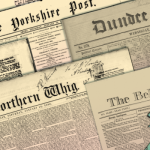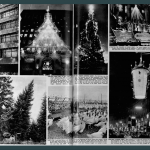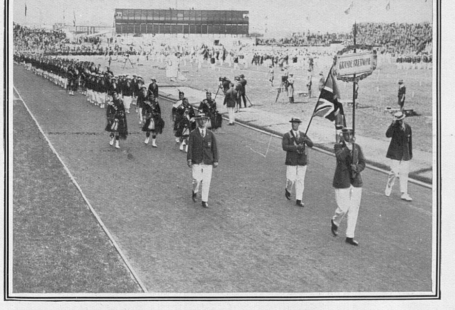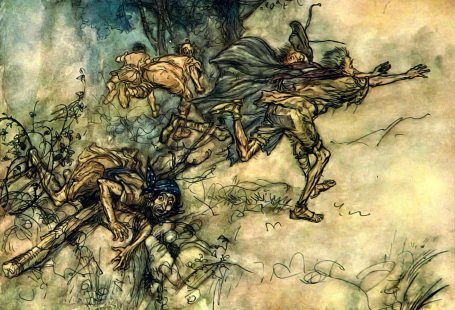
It’s 1841 and Josiah Mister is on trial in Shrewsbury for attempted murder – committed at the Angel Inn in Ludlow.
The victim was William Mackreth, a trader from Bristol who was in the town for the summer fair. In the early hours of the morning, he was brutally attacked by someone who’d been hiding under his bed. He managed to fight him off and his assailant escaped; a trail of blood led to Josiah’s room and he was arrested.
But did he do it?
March 1841
A huge crowd, said to be in the thousands, had gathered in the square in Shrewsbury at the Assizes court next to the Market Hall.
They were pushing to get a seat in the public gallery to watch one of the most anticipated trials and to catch sight of the man accused of a shocking and atrocious crime.

At an earlier hearing, a newspaper reporter had described the defendant as he stood in the dock as follows:
He has a large and full mouth, with that the artists term a well-chiselled upper lip, expressive of strong, very strong, animal passions, and steady determination; his eye is peculiar and (though rather dimmed on the morning in question) was bright, glittering, and wild as that of a newly-caged rat, the day previous, when first in custody.
But today was the start of the full trial and the jury were told to ignore any stories about the case and accounts of the prisoner they’d heard outside of the court and to put aside any prejudices they may hold.
Josiah Mister, who looked younger than his 25 years, faced the court and the charges were put to him: wounding with intent to disfigure, maim and murder.
In a loud and determined voice, he replied NOT Guilty.
Seven months earlier

It was Thursday, 20 August 1840, at 11 o’clock, on the end of a busy market day in Ludlow. William Miller Mackreth – a trader from Bristol – retired to his room at the packed Angel Inn; he locked the door, blew out the candle, and went to bed. The clock ticked and the hours past, until it reached 4 o’clock.
A sudden loud smash startled the guests and the landlord, Mr Edward Cooke, who woke to the sound of blood-curdling cries of fire coming from an upstairs room.
They rushed to see what was going on. And on the stairs were confronted by Mackreth, in his bedclothes with his blood-soaked hands gripping his throat where he had a gash that stretched from ear to ear
Shocked, Cooke asked, ‘what have you done to yourself?’, initially thinking he’d tried to take his own life.
They took him back into the bedroom and sat him down. The room was now busy with people coming in and out to see what had happened and offering help.
A doctor was staying at the inn and was on the scene to help staunch the bleeding.
They passed him a steel-nibbed pen and he started to scrawl: ‘Some villain has done it, he stood on my left. I grasped his hand. He escaped…Is there any danger? Is the man found?’
Mackreth pointed to the bed; they tentatively looked underneath and saw a match, a piece of sandpaper and, next to it, the figure of a man clearly marked in the dust.
Monday, 10 August 1840 – Summer Fair Season
Shrewsbury. Mr Ludlow, a well-known, wealthy butcher, stout and elderly, was staying at the Unicorn Inn at the bottom of Wyle Cop. A regular customer, he’d just arrived on a coach from Birmingham and spent time talking to a fellow trader in the commercial room.
It was busy there, bustling with other traders and travellers, including Josiah Mister. Mr Ludlow didn’t know him, but Josiah knew Mr Ludlow, and he’d been taking a keen interest in him.
The night before his arrival, Josiah had been asking the waitress if he was coming.
After Mr Ludlow had arrived, and later retired to bed, Josiah, now on friendly terms with the waitress, probed her further – asking her how long he was staying and in which room – she told him, adding that he was sharing it with a friend.
On Wednesday, Mr Ludlow left the Inn. The following day so did Josiah, leaving his bill unpaid.
Josiah Mister, with just a penny to his name, made his way to the town of Ludlow, 27 miles away.
He walked, hitched lifts, and took shelter overnight in barns and hayricks, and begged for food. He arrived there on Wednesday the 19th, the day before market day.
At 7 o’clock, Josiah was sitting on the bank of the River Teme where two local men were fishing. He asked them when the Red Rover coach was due to arrive. An hour later, it trundled past, and Josiah bolted after it.
It pulled up outside the Angel Inn and Mr Ludlow stepped out. He went inside and Josiah followed him, tightly, as if to give the impression to others that they were together. Recognising Josiah from his earlier stay in Shrewsbury, he invited him to sit and they had tea together before Ludlow went into another room.
The evening wore on and at 10.30 the chambermaid, holding a candle, escorted Josiah Mister upstairs and along the corridor to his room, number 20.
Another guest was staying at the inn that night, but he’d been out all day and returned late. His name was William Miller Mackreth, a 30-year-old cattle dealer from Bristol.
At 11 o’clock, the busy chambermaid took him to his room, to the top of the same set of stairs to room number 17.
This was unusual; for many years this room, during market days, had been reserved solely for Mr Ludlow, he was always in there except this one occasion. For some reason, he’d been given a different room, number 20.
Mackreth went inside with the candle, locked his door and blew out the light – it was pitch black.
The clock ticked and the hours past until it reached 4 o’clock. AND HE WAS ATTACKED. He woke, put his hands to throat and felt a hole. His face and bedclothes were wet with blood. He was slashed again in the face and jumped up and fought off his attacker who bolted out of the room.

Two hours later, the police were at the scene. Officer Hammond stepped out of Mackreth’s room, looked down and saw the drops of blood on the carpet; they were leading down the corridor, and he followed the trail to where they stopped, near the door of Josiah Mister. He pushed open the door and saw Josiah coiled up beneath the sheets. There was a smear of blood on the curtains and bowl of soapy water.
The area and his room were searched, and in the yard opposite they found a razor with bloody smears that someone had hastily, but unsuccessfully, attempted to wipe off.
Josiah was immediately arrested and taken into custody.
Seven months later, Josiah Mister stood in the dock – slight in stature but looking confident.
His trial was about to start. However, with the weight of evidence against him, it was surely just a matter of time until this mild-looking young man would end up on the end of a rope.
The Trial and Case for the Prosecution
The trial began at precisely 9 o’clock in the morning on Tuesday, 23 March 1841.
The heaving courtroom in Shrewsbury had fallen silent to hear the counsel for the prosecution outline its evidence. The counsel for the prosecution was made up of three of the top legal minds who would call no less than 40 witnesses to the stand. They were determined to prove that Josiah Mister was the man who’d committed this terrible crime and should hang.
There were 4 key pieces of evidence:
1. Who was the real target…and had the attacker got the wrong man?
In the weeks running up the attack, Josiah Mister had been showing an unusual interest in Mr Ludlow, someone he’d seemingly stalked all the way from Shrewsbury – and he was keen to know where he was staying, as many witnesses were able to show.
And for years, whenever Mr Ludlow came to Ludlow, he always stayed in room 17 at the Angel Inn, always, except this one occasion. For some reason, this time he didn’t, and it was taken by William Mackreth.
In the immediate aftermath of the attack, Josiah behaved very strangely.
The victim recalled seeing him at the end of his bed, while the doctors were patching him up. Josiah appeared to be laughing and was asking where his stockings had gone.
2. The match under the bed where the attacker had been waiting!
It was a Lucifer match. On his route to Ludlow, Josiah stopped and talked to a nine-year-old boy and his friend in Church Stretton. They were tormenting a wasp’s nest with stones and a spade. The boy described how Josiah had prodded the nest – and then produced a Lucifer match telling them that that was what they needed, but then he placed it back into his waistcoat.
3. The Razor in the Yard.
A razor with a black handle was found with blood partially wiped from the blade. It was at the foot of a woodpile, which was within easy throwing distance from room 20 where Josiah was staying.
When his room was searched, no razor was discovered, just a penny and a type of soap called alum.
At the trial, a former Birmingham housemate of Josiah’s gave evidence that he had lent Josiah a black handled razor the month before the attack and hadn’t had it back.
4. But perhaps the most crucial evidence was the blood!
A trail of blood led from the victim’s room down the corridor to Josiah’s door. There was a smear of blood on the curtains and spots of it on his shirt
In an early example of forensic testing, a surgeon who’d been at the inn examined the scene after Josiah had been arrested. He saw a bowl filled with water; he dipped his finger in it and could taste alum; all good doctors know that using alum is the perfect way to remove blood from clothing. It was also something people would use to stop shaving cuts. The implication was clear, Josiah had tried to wash off any blood.
In the face of what seemed an overwhelming amount of evidence, Josiah Mister, in the defendant’s box, looked calmly on.
It would take perhaps the greatest feat of persuasion to convince the jury of his innocence.
Step forward Mr Valentine Lee, the well-known eminent barrister from Oxford.
The Defence
Valentine Lee was one of the most eminent barristers on the circuit, tipped to one day become a judge, and was defending 25-year-old Josiah Mister, a man from a respectable family in Birmingham who now found himself charged with attempted murder.
In his opening statement, he told the jury that the prosecution’s case was based on cruel and absurd speculation, and then he began to rip the case apart.
1. The evidence of the Lucifer match.
A young boy had seen Mister with one at Church Stretton when they were by the wasp’s nest – and the inference was immediately drawn that this was the same match that was found underneath Macreth’s bed! Well, so what? Lots of people have matches, what’s the proof that this is the same one?
2. The Razor in the yard
As soon as it was found – it was straightaway assumed it belonged to Josiah. They also assumed this razor was one that used to belong to his former housemate in Birmingham, Mr Vaughan – and yet the razor he supposedly lent him had a mark down the middle, the only way to get rid of this mark would be to grind it off. And yet the razor found in the woodpile had no mark, but neither did it have any signs that anything had been ground off it.
3. The blood…
Mr Lee showed the jury the shirt that Josiah Mister was wearing at the time of the crime.
They looked at it carefully and saw a few spots of blood. Think about it, he urged the jury, remember how brutal and bloody the attack had been. Wouldn’t there be considerably more blood on the shirt if Josiah was the man who’d done it? He showed them the curtain, and it took them some time to find two small marks – hardly worth looking at – it can’t be fair for a witness to be asked if these could have been made by throwing something out of the window, and only in particular way, he said. In fact, how do you know it’s even blood?! Talk about stretching the evidence to fit your story.
Then there was the bowl of water – the taste test revealed it contained soap – well, so what? It would only really be of any evidential value if the doctor and surgeon who tested it had said they’d also tasted blood in it, but they didn’t!
And finally, the trail of blood leading to Josiah’s bedroom. Just after the attack the Landlord, Mr Cooke, and a guest who was next door to Josiah had been to see Mackreth, who was covered in blood. They then walked up and down the corridor a few times, fetching bandages. Having been in contact with Mackreth, is it not inevitable that they would get covered in blood, which they could then have dripped up the corridor, and by brushing passed Josiah, transferred a few spots on to him?
The forceful defence lasted for an hour and a half – concluding with Mr Valentine Lee telling the jury that Law, Justice, and Religion demanded a verdict of not guilty.
The Verdict
Josiah Mister stood in the dock, his dark hair centre parted and smoothly brushed down on each side. He was wearing a dark green coat with a velvet collar over his slight frame, a dark satin waste coat, and grey trousers with a black stripe, his shirt collar and wristbands slightly exposed.
He calmly looked at the jury, his eyes appearing rather large and very dark. but bright. It was 7.15 in the evening. The public gallery was packed, mostly by women. And they were hushed.
The jury had returned after deliberating for just 35 minutes.
The foreman stood up and the judge asked him for a verdict.
The juror replied…
GUILTY
Josiah swerved back – as if hit by a fatal blow.
He covered his face for a minute and tried to regain his composure. The clerk asked him why he should now not die according to the law. Visibly shaken and in a subdued voice, he replied, ‘I am not guilty of it’.
The judge picked up his black cap and placed it on his head.
He summed up the case – and told Josiah to prepare for death by asking for mercy in the next world, which he wouldn’t be receiving in this:
The sentence of the law is that you be taken hence to the place whence you came, and thence to the place of execution, and there hanged by the neck until you are dead! May the Lord have mercy on your soul.
His face, now drained of colour, betrayed the intense mental agony he was in as he was led back to the cell.
Sitting in his cell, the condemned man wrote letters to his family and his fiancée, continuing to claim his innocence, when word got to him of a remarkable turn of events.
A petition was being drawn up for the death sentence to be commuted to transportation for life, on the basis of his youth and the fact that no murder had actually been committed.
His well-connected brother in Birmingham, John Mister, was behind the campaign, and backing him were a number of respectable people from Shrewsbury, the foreman of the jury, and Mr Ludlow – the man who it’s believed was the intended target of the attack.
With just 10 days between his conviction and the execution date, time was of the essence.
John Mister and Mr Ludlow went to Bristol to canvas William Mackreth himself, the victim of the bloody crime, to back them and he did! They made a personal appeal to the judge and the Home Secretary.
There was a high expectation they would succeed.
All they had to do now was to wait for the stagecoach carrying the mail to arrive.
The execution date drew closer and closer, and the Reverend dealing with Josiah noted how he regained the confidence he’d shown during the trial, despite being urged to admit and seek forgiveness form the Lord.
Saturday Morning, 3 April 1841
His jailers walked to his cell, unlocked the door and Josiah stood up. He was led up the stairs to the porter’s office. He sat down and the irons were taken off.
Earlier that morning, all the entrances to the town were clogged up with traffic, people pouring into the town from all over the country. There was a sense of excitement – and anxiety – waiting for the for mail coach to arrive.
A door in front of Josiah opened, and a man walked in. He was old, slight in stature, and had a mild expression on his face. He was wearing a smock frock.
He was known as the finisher of the law; no reprieve had come.
The bells sounded, another door opened, and Josiah was led out onto a platform in front of an excited crowd of thousands. A rope was put around his neck, the trapdoor opened and, with a loud crash, he launched into eternity.
Read a full account of Josiah’s execution
The rain started to fall, getting heavier over the next hour, and the crowd dispersed.
But there wasn’t a solemn atmosphere. In fact, the mood amongst the town folk was buoyant. The public houses filled up, the streets were busy with people enjoying themselves, and drunkenness appeared to be the order of the day.
Josiah Mister was laid to rest on the North Side of St Mary’s Church in Shrewsbury.
But that’s not the end of the story.
The Boozy Hangman
The hangman was a well-known alcoholic – nicknamed Jack Ketch (all hangmen had this name).
A perk of the job is that after you’ve hanged someone, you get to keep their clothes.
And that’s what he did; he took them, went to Bridgnorth the same day, and sold them as souvenirs. That night he spent the money on booze and got so drunk and rowdy, he was arrested and locked up for two nights in the town’s jail.

On Monday morning, they sent him back home to Stourbridge where he worked sharpening razors and scissors. His ability to do the job was greatly hampered by booze and work dropped off. He died 5 years later in Kidderminster.
An Accomplice?
Josiah Mister went to the grave still proclaiming his innocence; his final letter saying so was handed out to the press and the people in the crowd immediately after he’d been ‘turned off’.
But one question remained unanswered.
How did Josiah (if it was him) know where Mr Ludlow (the real target) usually stayed when he was at the Angel Inn?
It never came to light in the trial where he got this information from; the reports said it was still a mystery.
Well, who’s the person most likely to know the whereabouts of a hotel’s most loyal customers?
The landlord!
His name was Edward Cooke, and he didn’t appear at the trial.
Because just two weeks after the attack on William Mackreth, he was ‘so horror stricken’ that he ‘lost all reason’ and was sent a lunatic asylum.
According to the old newspapers, he stayed there the entire time right up to when Josiah was hanged (seven months). Then just two weeks later, he suddenly regained his sanity, made his peace with God, and died.

Perhaps it was Cooke who had innocently told Josiah earlier in the day where Mr Ludlow usually stayed.
And maybe the chambermaid just put them in the wrong rooms by mistake or Ludlow changed his mind at the last minute.
Or perhaps Mr Cooke was hoping for a cut of the ill-gotten profits from the robbery, which ultimately went wrong. Josiah got the wrong man, and he couldn’t even kill him.
In those days, asylums were good places to hide from the law, so perhaps that’s why Mr Cooke went there. And when Josiah was finally put to death, the guilt proved too much for the landlord of the Angel Inn, and he asked God for forgiveness and took his own life.
But I guess we’ll never know.






